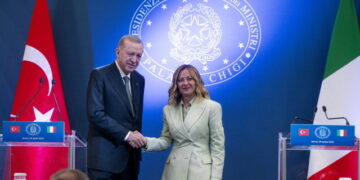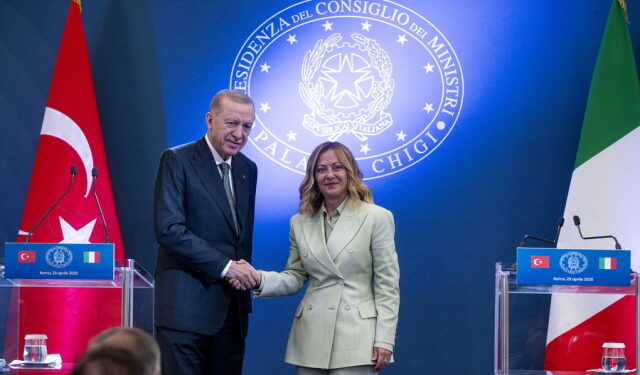Following the meeting between Meloni and Erdogan in Rome, the joint statement gives a favorable portrayal of Turkey, legitimizing its aspirations for a more active involvement in European defense while highlighting its role in promoting stability in the Middle East and Eastern Mediterranean. This declaration was released after the 4th Turkey-Italy Intergovernmental Conference on Tuesday, presided over by Erdogan and Meloni.
The document, along with Erdogan’s comments to journalists on the flight back to Ankara, reveals Turkey’s commitment to strengthening defense ties with Italy, particularly through collaborations like Baykar-Leonardo and the acquisition of Piaggio Aerospace. These actions position Turkey as a strategic player aiming for unqualified inclusion in European defense initiatives and the substantial €150 + €650 billion rearmament plan for Europe.
While the lengthy statement emphasizes both countries’ desire to enhance economic and defense cooperation, it notably omits any mention of human rights and the rule of law—key requirements for those seeking closer relations with the EU—and instead aligns completely with Turkey’s stance on maritime zone delineations in the Eastern Mediterranean.
Italy expresses unequivocal support for Turkey’s EU accession journey, without referencing the necessity to adhere to fundamental European principles or to settle the Cyprus issue.
Specifically, the joint declaration states:
“The parties agreed to work together to achieve tangible outcomes in several key areas, including expediting Turkey-EU discussions on visa liberalization, renewing migration cooperation, and enhancing counter-terrorism efforts.
They also acknowledged the urgent need to update the EU-Turkey Customs Union, with potential benefits for both sides.”
There is, however, no mention of Turkey’s crucial responsibilities regarding the Customs Union and adherence to the Protocol concerning the Republic of Cyprus.
Rome reaffirms its commitment to strengthening the NATO-EU strategic partnership, which is complicated by Turkey’s non-recognition of the Republic of Cyprus, and emphasizes “the significance of potential full participation by non-EU allies in EU defense initiatives to bolster this partnership.”
The relevant section highlights the successful completion of collaborative projects between Turkish and Italian defense firms in recent years and the political determination to promote this cooperation further. In this context, they plan to “organize the 14th Defense Industry Cooperation Meeting in 2025 and conduct seven high-level mutual visits and technical meetings to advance bilateral defense relations as a model for allied nations.”
Interestingly, the declaration addresses the Eastern Mediterranean, where both nations underscore the “importance of resolving maritime border disputes through international law and agreements, grounded in the principle of equality,” while failing to reference the Law of the Sea, which is part of the EU’s acquired legislation.
Moreover, the joint statement endorses Turkey’s proposal for an International Conference in the Eastern Mediterranean, suggesting that “a Multilateral Eastern Mediterranean Conference, when conditions allow, will present an opportunity to establish an inclusive cooperation framework in the region.”
Turkey claims that Greece and other neighboring countries are attempting to “exclude” it from collaborative platforms such as the Eastern Mediterranean Gas Forum (EMGF).
Despite the declaration mentioning unresolved issues in the Middle East and the Mediterranean, such as the Palestinian situation, Syria, and Libya, it conspicuously ignores the Cyprus problem and potential violence, issues that Italy, adhering to EU policy, should have addressed.
It is also surprising that the declaration highlights cooperation between Italy and Turkey in promoting peace in third countries, stating: “They emphasized the importance of collaboration to foster peace and stability in third nations and regions, respecting sovereignty, independence, territorial integrity, cultivating good neighborly relations, and encouraging economic growth and regional connectivity.”
Additionally, Italy and Turkey agreed to jointly work on oil and natural gas projects in third countries, which would be advantageous for Turkey’s state oil company, TPAO.
While Italy’s significant relationship with Turkey is important, the way Rome and Meloni aim to act as Turkey’s “voice” within the EU—validating Ankara’s ambitions—raises concerns. It appears to overshadow and neglect critical principles of EU legislation and binding decisions.
Ask me anything
Explore related questions

















